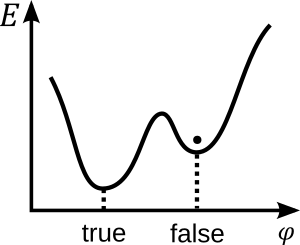False vacuum facts for kids
A false vacuum is a cool idea from theoretical physics. Imagine the universe is like a ball rolling on a bumpy surface. A true vacuum is like the ball resting at the very lowest point – the most stable spot with the least energy. A false vacuum is like the ball resting in a dip that's not the lowest point, but it's still stable for a while. It has a bit more energy than the true vacuum.
In quantum field theory, which studies the tiny particles that make up everything, scientists think a false vacuum could exist for a very long time. But eventually, it might change into a true vacuum. This change happens through something called bubble nucleation.
What is a False Vacuum?
Think of energy like height on a landscape.
- A true vacuum is the lowest valley, the most stable place where the universe wants to be. It has the least possible energy.
- A false vacuum is like a higher valley or dip. It's stable for a while, but it's not the absolute lowest point. There's a "hill" or "energy barrier" stopping it from rolling down to the true vacuum right away.
The universe might be in a false vacuum right now! If it is, it means there's a chance it could change to a true vacuum.
How Does a False Vacuum Change?
The process where a false vacuum changes to a true vacuum is called bubble nucleation.
- Imagine a tiny bubble suddenly appearing somewhere in the universe.
- Inside this bubble, the energy state is lower, like the true vacuum.
- This bubble then grows super fast, expanding outwards.
- As it expands, it changes everything it touches to the new, lower energy state.
- This process would release a huge amount of energy, completely changing the laws of physics as we know them.
Scientists are still studying if our universe is in a true or false vacuum. It's a fascinating mystery about the future of everything!
Images for kids
See also
 In Spanish: Falso vacío para niños
In Spanish: Falso vacío para niños
 | Isaac Myers |
 | D. Hamilton Jackson |
 | A. Philip Randolph |



